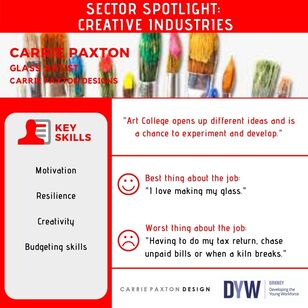 In our next Sector Spotlight is focusing on Creative Industries. Today we hear from Carrie Paxton, who is a Glass Artist based in St Ola, Kirkwall. Carrie started her career as an apprentice in a design studio, she then undertook a degree and post-graduate qualifications as a mature student after starting her family. She now runs her own studio and produces a range of items as well as undertaking commissions for businesses and individuals. Can you describe a typical day in your role as a glass artist?
My day starts with a trip through to my studio to prop the kiln lid open a few centimetres. This allows the contents to cool gradually. After breakfast I can open the lid fully and inspect the previous day’s work. I’ll spend the day preparing work to refill the kiln. Most pieces will need a further firing so I will add detail to the previous firing. I’ll cut glass to the required size from large sheets of clear glass. Cut pieces will need cleaning and possibly sanding the edges ready for the first application of colour. I have a large kiln and will make sure it is full before I set it ready to fire. If I have any urgent orders I will use my small kiln as I can fill that quickly and I can speed up the process. I check my phone regularly to keep up to date with any new orders or enquiries. The evenings are spent ordering materials, writing invoices, keeping up email dialogue with customers, creating adverts and publicity around any new products. How did you end up in this role? I started working life as an apprentice in a design studio where we provided graphics and exhibition design for clients. I received a great wealth of experience in a job I loved and also how to work with clients and interpret what they want and what will work for them. My next job was running my own studio with a large organisation. Providing much the same services for their business; working to their briefs and producing a variety of publicity. The next step was a degree at Art College studying Architectural Glass followed by a Post Grad. in Design. I was a mature student and a single parent with two children to support. This course changed my life in so many ways. This experience changed my career and my outlook on everything. These main career choices were punctuated by several part-time jobs too dull to mention. What is the best thing about your job? I love making my glass. I love making things. What is the worst thing about your job? Having to do my tax return, chase unpaid bills or when a kiln breaks. What skills do you need to undertake your role? You need motivation, resilience, budgeting skills, and creativity. I also need good communication skills with my customers and the outlets I supply. As a sole worker you need to learn skills in areas that are not your forte. The more you can do for yourself: a. the more control you keep and. b. the more money you save from paying other professionals. What qualifications do you have? BA (Hons.) Architectural Glass Post Graduate Design Would you recommend this job to young people, if so why? I would recommend this job to young people however it is now very difficult to study ‘glass’ at Art College. I studied at Edinburgh College of Art and the course I studied doesn’t exist anymore. There are some degree courses in England. There are many fused glass workers but less stained-glass artists. Fused glass is made with manufactured coloured glass cut into shapes and fused onto another sheet of glass. There are some very skilled fused glass artists. Stained glass is sheet glass cut and painted with frits (glass ground to grit or powder) and traditional enamels, silverstain and lustres. The fired glass pieces are leaded together and soldered to make windows. This is a very skilled job. Similar to most jobs in the creative field, it is difficult to make huge amounts of money. You have to want to do this job and get pleasure from what you make and be prepared to push your product yourself. You can make a living doing this but there are few days off and no set finishing time to your day. However, you are your own boss and can choose the direction your business takes. Plus you’re a long time working so you might as well choose an occupation you are interested in. There are also the exceptions to this, there are certain businesses everywhere and good examples in Orkney where lone makers have developed their business into major successes - Sheila Fleet and Ola Gorie to name two examples. Also, I am great believer in further education and in my case Art College. I believe it opens up different ideas and a chance to experiment and develop. However, it’s not for everyone plus it’s something you can consider at a later stage as I did. I did an apprenticeship and later a degree and none of this was a waste of time. Knowledge and experience gained always have a way of coming back round and informing what you do. Visit Carrie Paxton on: Website: https://www.carriepaxton.com/ Facebook: https://www.facebook.com/CARRIEPAXTON.GLASSARTIST/ Twitter: https://twitter.com/carrie_paxton Comments are closed.
|
Archives
June 2024
Categories
All
|
 RSS Feed
RSS Feed